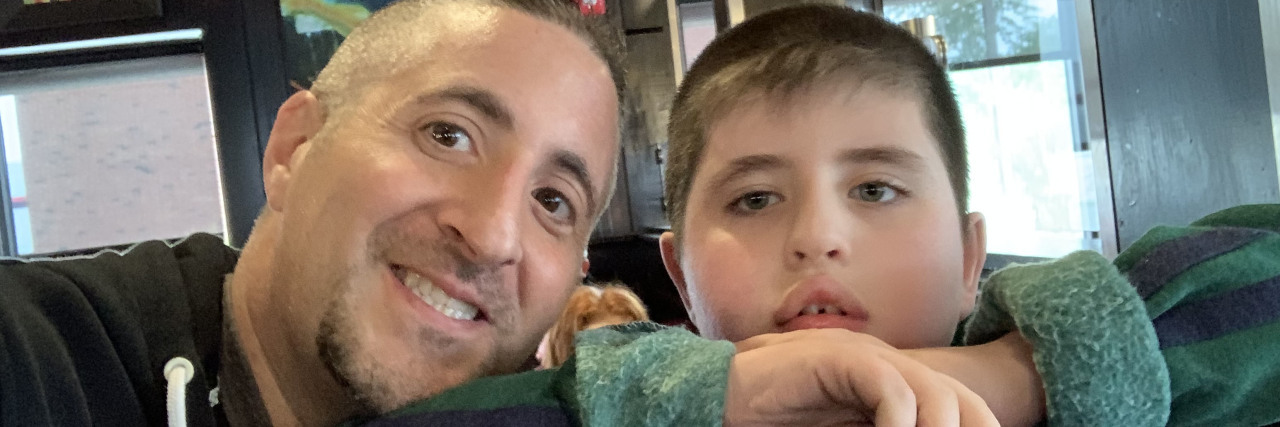I’ve received some strange compliments in my life, especially as it relates to raising my children. As a very-involved father, some professionals have marveled at the fact that I’m involved at all. In the words of one shocked special education coordinator, upon receiving a call from me rather than my wife, “Oh, well. OK. Ha ha. We like dads here too!”
I told you. Weird.
The bizarre reactions to a man who cares for his children stretch even further when one of those children has autism or anything deemed a “challenge.” It’s at this point where all the memes, focus, and discussion centers around mothers. Whether it’s a comedic infographic on Facebook or a t-shirt with way too many words printed on it, all anyone can talk about is the strength of the “mama bear” in the face of this somewhat-overhyped adversity.
As the father of an 8-year-old nonverbal son, I have dealt with surprised professionals and bizarre praise. The most perplexing happened early on, and to this day, I still think about it.
We were going over my son’s eventual school plan with a number of different “experts.” One, with her studious spectacles and three-ring binder, offered me these words of… uh, something.
“It’s good that you’re so involved with Lucas. Many fathers in your position can’t accept their children.”
I wasn’t sure what she meant. So, I asked her.
“What do you mean? Accept them?”
I wasn’t prepared for her confused expression. In hindsight, I guess she was so used to saying things like that without being asked to explain that it put her on the defensive. If it was meant as praise, it shouldn’t have been so difficult to offer clarification.
“Well, they don’t accept them. They can’t really come to grips with it.”
She hadn’t explained anything, but simply swirled the letters around in her word salad, so I told her the assumption I had made about her “compliment.”
“Are you saying they leave? The fathers leave their families?”
I was familiar with the feeling in the air. It was that awkward moment I had created at different times in my life. A voice in my head says, “Just let it go, weirdo. She’s being nice.” But another voice says, “Yo. This lady is badmouthing your kid.”
She seemed uncomfortable. I was too. But still, she had no choice but to answer.
“Yeah. I guess.”
“Well, I’m not going to leave him,” I responded. “I love him. I guess he’s lucky to have me.”
That back-and-forth exchange has rattled around in my brain for the better part of six years. It was one of the most insulting things — not just to me, but to dads in general. It was praise for not being a piece of garbage parent. It was applause for not leaving my family because my child hadn’t turned out in a way some people would deem perfect.
While many mothers are being congratulated for honoring commitments to their children with disabilities, fathers are being congratulated for staying in the house. It’s such a difference in bar placement, and one I find a bit insulting as a dad who couldn’t imagine any other scenario.
I love my children and wouldn’t change them for the world. My son has autism. My daughter does not. My love for each one is different but equal. The bonds I share with both are stronger than I have with any other person on the planet. I can’t describe what we share, but I know it’s special. Raising them isn’t just a commitment. It’s a privilege and an honor.
There’s no reason to marvel at the fact that I’ve remained with my kids. Instead, marvel at those who choose not to. Marvel at those who decide to bring a baby into the world and then walk away because they aren’t some sort of idealized dream they had of what a baby “should” be. Point at those fathers. Give them the criticism they deserve. Their choices aren’t the norm and mine isn’t the exception. At least, it shouldn’t be.
Just like that coordinator said many years ago, “we like dads here too.” We should. We all should and we should hold them to a higher standard. Our responsibilities are just as real as all the mama grizzlies sending each other positive vibes on social media. Our standards for all parents should be higher and it’s about time we held ourselves to them.

